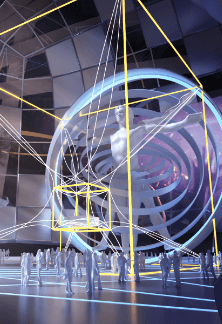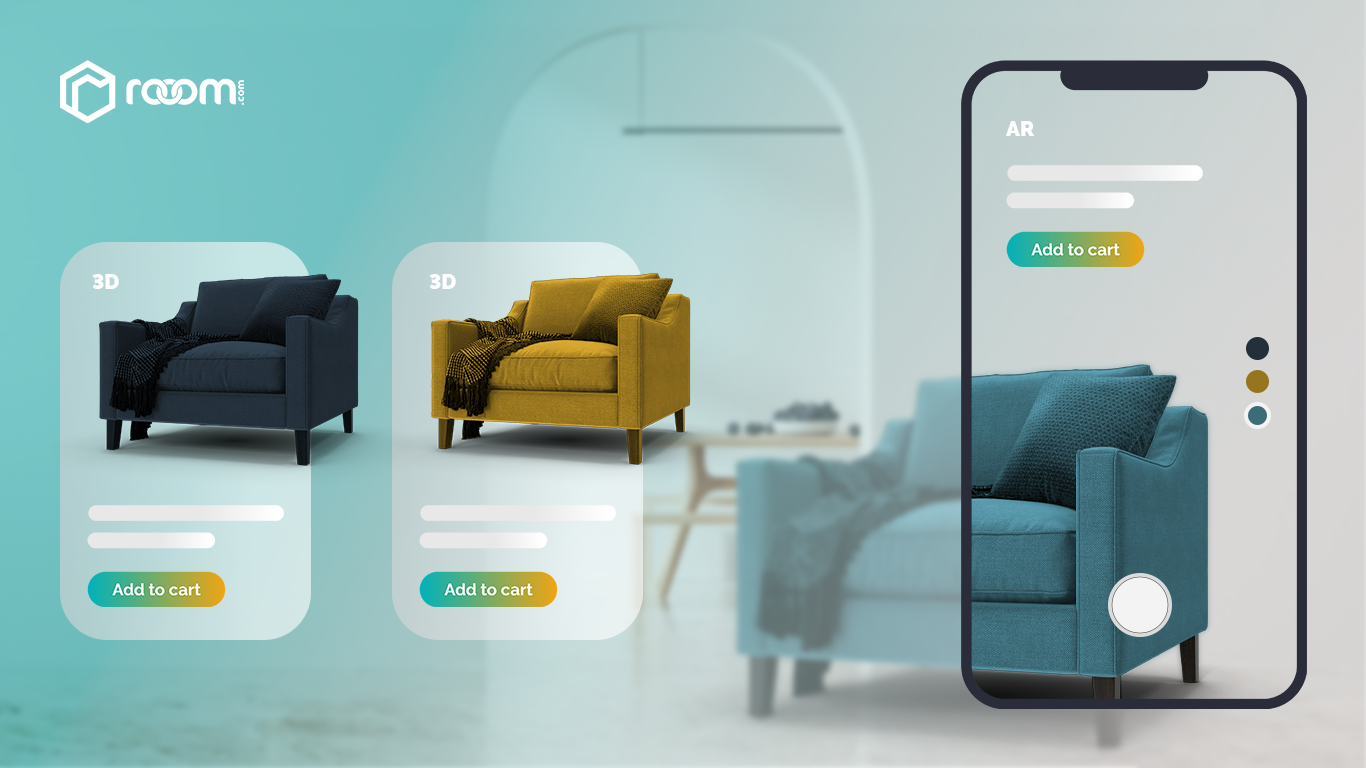Blog
How AI Will Invigorate Metaverse Worlds

- Hot Topics
- Blog
There has been a huge amount of buzz around the metaverse, with predictions focusing on the transformative impact that this convergence of virtually augmented realities and the physical world will have on businesses and individuals everywhere.
If these predictions are to come true, it is likely that artificial intelligence (AI) will play an important role in the most impactful new metaverse projects. AI in the metaverse will guide users, enhance the rendering of digital worlds, and help with the processing of human input.
To gain a clear understanding of how AI is set to unlock the full potential of the metaverse, we’ve provided a detailed explainer of what AI is, how it is being used today, and what it brings to the rooom platform.
What is artificial intelligence?
Although many different definitions of AI exist, they broadly center on the concept of machines simulating human intelligence. AI enables computers to display various forms of advanced functionality, allowing them to “see,” understand human language, and communicate.
New Scientist defines AI in the simplest possible terms: “Artificial intelligence or AI simply means software used by computers to mimic aspects of human intelligence. For example, a program that recommends what you should read based on books you’ve bought or a robot vacuum that has a basic grasp of the world around it.”
AI is usually split into two different categories: artificial general intelligence and artificial narrow intelligence. Artificial narrow intelligence is programmed to complete a specific task - but that task alone - often using a learning algorithm. Artificial general intelligence, meanwhile, can reason, solve problems, and, essentially, complete any task that a human can. In the metaverse, AI of any kind could greatly improve the level of engagement between users and the virtual worlds they interact with.
What AI examples are there?
Although AI may sound futuristic at first, there are currently many examples of the technology being used to enrich our lives. One well-known instance of AI involves chatbots, where algorithms learn from interactions to respond with increasing accuracy to customer service inquiries. In the metaverse, for instance, conversational AI already promises to improve interactions between businesses and customer avatars.
Machine learning explained
A branch of AI, machine learning enables computers tolearn without being explicitly programmed on a particular concept. While traditional programming asks developers to create detailed instructions for computers to follow, machine learning uses training data so computers can learn about a concept for themselves, recognizing patterns and making accurate predictions.
Even unlocking your smartphone may depend on AI. For example, Apple’s FaceID uses machine learning as part of an AI algorithm to compare a scan of your face with the image it has stored of you. This allows it to determine whether the individual trying to unlock your phone is really you or not.
Other AI examples range from the way streaming services provide tailored recommendations based on your previous viewing habits to autonomous vehicles. The potential applications for AI are practically limitless and new AI-backed programs are being developed all the time.
Which companies use AI?
With the business benefits of AI becoming clearer, many companies are already adopting the technology. These include:
- Amazon - Consumers may have first-hand experience with the way that Amazon employs AI through its Alexa voice assistant, but the technology giant also uses AI in several other ways. The e-commerce firm uses AI to process the vast quantities of data at its disposal, improving its ability to provide personalized shopping recommendations.
- IBM - An early champion of AI, IBM made headlines back in the late 1990s when its Deep Blue supercomputer beat the world chess champion Garry Kasparov. Today, IBM uses AI to deliver supply chain insights, natural language processing, and security enhancements for its clients.
- Flatiron Health - Healthcare firm Flatiron Health uses AI to leverage large quantities of data to improve outcomes for cancer patients. Through AI, Flatiron can analyze data in near real-time, greatly speeding up diagnoses and clinical programs.
Today, AI is being used by businesses from across the corporate world, whether they are intent on creating self-driving cars, e-commerce platforms or any number of other business proposals. Already, the metaverse and AI are being used in partnerships to redefine business proposals, leveraging data and advanced analytics to improve the user experience.
What are the different AI models?
AI is underpinned by various models that will aid in the decision-making of an AI solution. The different AI models each have their own strengths, with some being better equipped to solve certain business problems than others. Some of the most common AI models include:
AI in e-commerce
One of the most exciting use cases for AI is in the e-commerce sector. In combination with the Metaverse, AI will enhance customer experiences, delivering greater personalization and more accurate product recommendations. While the Metaverse can be used to create 3D product views, AI can empower individuals to interact more closely with items and enable e-commerce firms to make better decisions around marketing and sales.

Linear regression: This AI model has its roots in mathematical statistics and has been employed for decades. The linear regression AI model uses a linear equation to predict the output from a specific input value. Solving the equation at the center of your linear regression model enables you to make predictions for certain variables.
Decision trees: One of the simplest AI models around, decision trees work by offering binary yes/no answers at each split in the tree. The answers to previous questions help inform the final result. This model can be used for a multitude of different AI problems.
Deep neural networks: This AI model was inspired by the human brain and uses layers of artificial neurons to calculate the combination of multiple inputs to derive a desired output. The deep neural network model is adaptive, allowing computers to learn from their mistakes and continuously improve.
These are just a few of the most prominent AI models that are likely to be involved in any metaverse project. Ultimately, the goal is to create an artificial general intelligence solution that can solve any problem - just like the human brain. Until then, different AI models can help create the specific solutions that businesses need.
You are interested in Metaverse e-commerce?
Get in touch with our experts and learn which of roooms e-commerce solutions are matching your needs.
rooom, AI and the Metaverse
- Avatars - With rooom, you can create unique avatars within corporate metaverses, showrooms and at virtual events using AI. These avatars leverage AI to ensure they are fully personalized and can provide information about services and products when visitors ask questions.
- Generate new Metaverses - One of the main benefits of the metaverse is that there is more than one - in fact, there is an infinite number of metaverses for you to explore. With AI, you can automatically generate rooom metaverse environments based on just a few inputs.
- Intelligent rendering - Using AI, 3D data uploaded to the rooom system can be categorized. The system can then recognize which type of thing the uploaded object belongs to. For example, a chair has four legs, a seat, and a back. The AI can learn to recognize such patterns and thus better compensate for missing data.
- Develop interfaces faster in an automated way - Our metaverses enable individuals, companies and also representatives from culture, tourism and education to create and edit 3D models and spaces themselves. AI can streamline the creation of these spaces by analyzing the inputs you provide.

What are the risks of using AI?
Often, science fiction likes to present AI as an apocalyptic risk for humankind but while this sort of scaremongering may be wide of the mark, AI does present risks. One of the most widely recognized involves the introduction of bias into a decision-making process. AI solutions are only as good as the data upon which they were trained. If this data has been compiled in a biased manner, the results that your AI platform produces will also be prejudicial. AI may seem impartial but, depending on the data it is relying on, this may not be the case.
There have also been concerns about the impact AI could have on privacy and security. The way that AI is capable of collecting, processing and analyzing vast amounts of data at speed presents ethical quandaries, whether they relate to mass surveillance or predictive policing.
Conclusion
There is no doubt that AI has the potential to transform the way we live our lives in many ways - just as the Metaverse does. Together, AI and the Metaverse can take user inputs and create new interfaces, avatars and experiences that meet the needs of individuals and businesses alike. At rooom, we understand the power of the metaverse - and we know that AI can help unlock it.


















